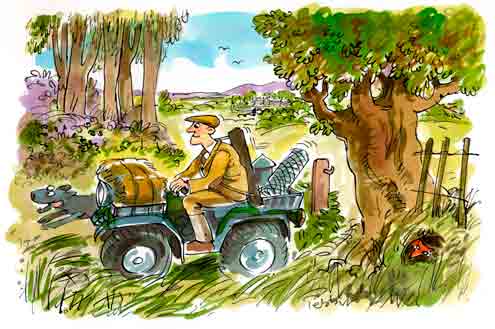Farming Breeds: Jack – the underkeeper

Join us for a funny, irreverent look at some of the characters that make the British countryside what it is. Our tongue-in-cheek guide puts characters such as the retired Major, the “perfect” next-door farmer and the young tearaway under the microscope. Here we meet Jack – the underkeeper who is keen so prove his shooting skills…
Jack is underkeeper on a large estate in the home counties.
He’s been in the job for a couple of years, having moved from another estate where he learnt his trade. That was his first job – he did it in tandem with a day-release qualification at his local ag college (or land-based centre of rural entrepreneurship and excellence, or whatever it is they like to be called these days).
You can spot him out on the estate – on his ATV or in the truck, a pile of pheasant feeders and wire in the back, along with a couple of bales of straw, some tools, some spent cartridge cases and the remains of some unidentifiable small animal.
“Mellors,” the lads at school called him when he first shared his career plans. Having met the lady of the manor, he’s not in any rush to emulate Mellors too closely.
His love of keepering started when he was 14 and he spent a few days with the local keeper. That was it, he was hooked: the outdoors life, the smell of a just-fired shotgun cartridge, all the stories, the banter.
And then there’s the head gamekeeper – Jack never tires of talking to him. Absorbing some of his knowledge, his sense of place, the way he fits into this 3,000ha slab of countryside.
He loves the old boy’s dirty jokes, too (although Jack wasn’t so keen on hearing an anecdote involving his mum… turns out the two knew each other rather better than most people are aware).
From that first introduction, it was on to the day’s beating – a great laugh with the camaraderie and even a few nips of brandy from a hip flask.
Of course, he’d do the job differently to how the old keeper does it. Jack’s been taught some of the new ideas about countryside and wildlife management. Not all of them sunk in, but a procession of lecturers repeatedly used words like “habitat” and trotted out acronyms that eventually all came to sound the same.
Keepering’s changed in so many ways. It’s not about the size of the bag anymore (“unlike in other areas of life, my lad!” the old keeper points out). It’s about the quality of the sport. The height of the birds. The variety.
It’s all changed, being a gamekeeper. Forget the old image of someone who spends their days (and most of the nights) doing unsavoury things to an assortment of wild animals.
“Now it’s about caring for the natural environment,” one lecturer had said. “We manage ecosystems.”
The old keeper hadn’t heard the word ‘ecosystem’ before: he thinks it’s something to do with the septic tank.
Keepering’s changed in so many ways. It’s not about the size of the bag anymore (“unlike in other areas of life, my lad!” the old keeper points out). It’s about the quality of the sport. The height of the birds. The variety.
It’s about, he says, repeating a phrase he’d heard on his course, satisfying the client.
“Never heard them called that before,” the old keeper mutters.
The old keeper is 60 and that means, given the traditional career path of keepers, that’s it’ll only be another 25 years until he retires.
Jack has a complex, sometimes contradictory attitude to his birds. They’re a source of perennial frustration, but how he wants the little slingshots of meat and feather to prosper and grow through to shoot day.
Shoot day is when it all comes together. When it’s all worthwhile. You should see some of the tips.
And when it’s beaters’ day, it’s a chance for Jack to showcase his own shooting skills. To dazzle. Not many people know: he’s actually a fabulous shot.
“Bravo,” the estate owner cries, having seen him hammer a high left and a right.
The owner calls him by his surname. Jack refers to him as “Your Grace”. The concept of egalitarianism hasn’t quite reached the manor house yet.
But what does Jack care? In his head, this is his fiefdom. He roams it followed by an assortment of dogs: terriers, spaniels, Labradors. Cats aren’t quite so popular in his cottage.
Foxes, needless to say, aren’t on the “approved” list, either. Ditto weasels, crows, rooks, magpies and jays.
Jack knows the estate in all its many incarnations. He’s seen it in all weathers, all seasons. He’s 25, but he’s got the weather-beaten skin of a 50-year old.
Mostly it’s a check shirt you’ll find him in, with his tweed suit and plus fours getting intermittent outings. He’s long since stopped being susceptible to any itching in the trouser department, although he feels himself cooking alive in it on warmer days.
It won’t do you any harm, you could do with losing a few pounds, his missus teases him.
He’s not in her good books at the moment: he’s just acquired two more ferrets and installed them in a hutch outside the back door of the cottage.
“What about the smell?” she’d asked.
“They’ll get used to it,” he quipped back.
